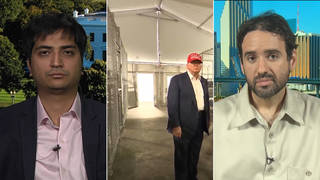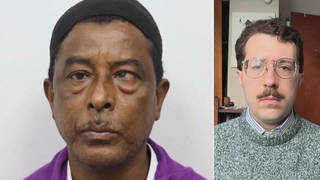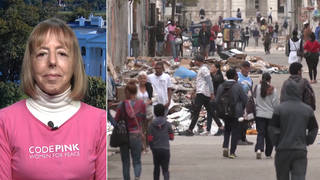
We speak with ACLU lawyer Eunice Cho about a new federal lawsuit brought on behalf of immigrants held at the detention center in the Florida Everglades dubbed “Alligator Alcatraz.” The detainees allege being routinely subjected to human rights abuses, denied due process and access to legal counsel, while families have complained of being unable to find their loved ones “disappeared” into the facility. “These are basic constitutional rights that are afforded to anybody that is held in government custody. And what was happening at Alligator Alcatraz is simply unprecedented and not normal,” says Cho, senior counsel at the ACLU National Prison Project.
Transcript
AMY GOODMAN: This is Democracy Now!, democracynow.org, The War and Peace Report. I’m Amy Goodman, with Juan González.
We end today’s show looking at what Republicans have dubbed “Alligator Alcatraz,” that recently opened immigration jail in the Florida Everglades. This is President Trump speaking during a tour of the jail in July.
PRESIDENT DONALD TRUMP: You know, snakes are fast, but alligators are much — we’re going to teach them how to run away from an alligator, OK, if they escape prison. How to run away: Don’t run in a straight line. Run like this. And you know what? Your chances go up about 1%, OK? Not a good thing. …
You have a lot of bodyguards, you have a lot of cops, that are in the form of alligators. You don’t have to pay them so much. But I wouldn’t want to run through the Everglades for long. It will keep people where they’re supposed to be. This is a very important thing.
AMY GOODMAN: On Monday, a federal judge in Miami heard arguments in a federal lawsuit brought on behalf of people detained at the immigration jail, built out of temporary tents, trailers, chain link fences with barbed wire, located in an area of the Everglades at high risk of flooding. The lawsuit alleges immigrants at the jail have been routinely subjected to human rights abuses and denied due process; the case brought by the American Civil Liberties Union, the ACLU of Florida and Americans for Immigrant Justice.
We go right now to Eunice Cho, senior counsel at the ACLU National Prison Project, lead attorney in the federal lawsuit, who argued in the Miami courtroom.
Can you explain what took place on Monday, what you’re suing over, and how the judge responded, Eunice?
EUNICE CHO: Well, thanks, Amy.
We brought this lawsuit because people who are being held at Alligator Alcatraz have had very little and limited access to talk to their attorneys and, until this weekend, were unable to file bond petitions to request release from custody. Now, as you know, these are basic constitutional rights that are afforded to anybody that is held in government custody. And what was happening at Alligator Alcatraz is simply unprecedented and not normal.
What happened on Monday is that we actually secured a very important victory. Because of the lawsuit, the federal government has decided that they’re going to reverse course, and they are now allowing immigrants who are held at Alligator Alcatraz the ability to petition the immigration court for release from detention, which is something that the government should have never been able to do in the first place. And I just have to underscore, it shouldn’t take a lawsuit to force the government to abide by the law and by the Constitution. The court order also transferred the case to another federal court in the Middle District of Florida, closer to where the facility is located, so now that court will issue a decision regarding the right of access to counsel at the facility. And we look forward to continuing that fight.
JUAN GONZÁLEZ: And, Eunice, could you talk about the difficulties that lawyers have had in reaching their clients and also family members being able to visit?
EUNICE CHO: Well, that’s a very good question. At the very beginning of this lawsuit, no, there was no attorney access whatsoever. We had attorneys who were trying to visit their clients, who would go to the facility, unlike any other facility in the United States. Normally, you’d be able to walk into the facility, show your identification card and your bar card. But here, it was completely different. Attorneys were met at military checkpoints by armed guards and turned away from the facility and being told that they could try to email an address to request a visit. When people were trying to email those email addresses, everything was bouncing back. There was no ability to get in touch with clients at all.
After we filed the lawsuit, the governor, DeSantis, said that the facility would start allowing limited attorney access at the facility. There have been some attorneys who’ve been able to visit their clients in person, but there have also been many attorneys who’ve never actually had the chance to meet with their clients there, because the delays have been so lengthy. One person had been detained at the facility for over a month, and despite repeated requests for an attorney visit, that still didn’t happen.
Families, of course, are not able to visit anyone at the facility. And the only way that people can communicate with their families is via a monitored, recorded phone line, where people can really only speak to their families for a few minutes at a time.
JUAN GONZÁLEZ: And your lawsuit also seeks to force the government to provide information about who is being held and where. Talk about the way that the government was disappearing people, or has been disappearing people.
EUNICE CHO: Well, that’s a great question. Usually, when somebody is held in immigration detention, there is an online locator system where people’s names show up, and you can see where people are being held in detention. And as you can imagine, if your family member has been taken by ICE and put into detention, they could be held at over 150 detention facilities nationwide. And it is so important to know where they are, so that you can establish contact, so the attorneys can get in touch to help to defend their cases.
And here at Alligator Alcatraz, ICE has simply not been recording anybody who is being held at the facility. So, even if you enter their name in the system, there’s simply no result, which is profoundly disturbing, when people are just being whisked off the streets. We have stories of people who were picked up in front of their churches, people who were on fishing trips with their families, people who were driving home from work being pulled over by the Highway Patrol and then transferred into immigration custody. Really, people are being pulled over for the, quote-unquote, “offense of being Brown.” And this really is a huge pattern of what is happening with this facility at Alligator Alcatraz.
AMY GOODMAN: Eunice Cho, you’ve highlighted the story of a man with disabilities who was forced to sign a document that turned out to be a voluntary deportation form. Explain what happened.
EUNICE CHO: Well, you know, one of the big problems with what’s happening in Alligator Alcatraz is that guards are going cell to cell, asking detainees or pressuring detainees to sign voluntary departure orders, really taking advantage of the very desperate conditions in which people are in. And all of that is happening without the ability to contact counsel about the very momentous decision that this represents. And we are hearing of cases of people who have valid claims to stay in the United States, even have court dates scheduled, who are signing these voluntary departure orders because they don’t know what they’re doing. And I think a very good, clear example of this is the story of an intellectually disabled person who was held at Alligator Alcatraz. Guards told him he was signing a piece of paper in order to get a blanket. And in fact, he was signing a voluntary departure order and was deported only a few days later.
The other abuses that are happening at Alligator Alcatraz just continue. We heard a story of a person who was denied a bond hearing. His bond hearing was canceled, and a few days later, even though he was still actively in immigration proceedings, has not received a final order of removal from the United States, was wrongfully deported from the United States to Guatemala. And he still remains there today, despite many attempts from his attorneys to have him returned back to the United States. This is just the type of harm that is resulting as a result of these constitutional violations that are taking place at Alligator Alcatraz.
JUAN GONZÁLEZ: And, Eunice Cho, this detention camp was built in complete secrecy. Could you talk about the state of Florida never holding a public hearing or obtaining local approval or going through an environmental review process before appropriating this land and building this facility?
EUNICE CHO: Well, everything about this facility is not normal. It is not precedented. And it is still somewhat unclear as to what the exact legal authority that it gives the state of Florida to be establishing this facility and holding people at the facility. And as you mentioned, the process in which the facility was built, it was so rushed. It went without environmental review. Our friends at Earthjustice and Friends of the Everglades have also brought a separate lawsuit challenging this reckless plan to build a massive detention center in the heart of the Everglades without going through any environmental review, as required by law. And so, another federal court, of course, is deciding that issue, as we speak.
AMY GOODMAN: I wanted to ask you about the bigger picture. You are senior counsel at the ACLU National Prison Project. Washington Post reporting ICE is planning to double its detention capacity to jail more than a hundred [thousand] immigrants. ICE has already expanded its jails, plans to open more around the country, another one in Florida, including in Nebraska, right near Lincoln, a prison so-called work camp, dubbed by Republicans “Cornhusker Clink.” Overall, how are you dealing with all of these and the corporations, the private prison companies, that are profiting?
EUNICE CHO: Well, I think this is profoundly disturbing, and I think this is unprecedented in nature. ICE has received $45 billion from Congress — $45 billion — to expand the nation’s immigration detention infrastructure. And to put this in perspective, last year, ICE received $4 billion for immigration detention. This amount of money will allow ICE to more than double the size of the immigration detention system in less than six months and expand it to a carceral system that’s larger than the entire federal prison system. They are planning to detain over 100,000 people per day.
And I want everyone to think about what is being built with these funds. While we are contending with historic cuts to Social Security, healthcare, education, veterans’ benefits, cancer research, these ones are being used to build detention centers around the country to lock up families, neighbors and our co-workers in these facilities, as we speak. Not only is ICE planning to enter into contracts with private prison companies, who are going to overwhelmingly benefit from this expansion, it is also planning to expand detention in military bases with tent camps, as well as local, state and prisons — federal prisons that have gone empty for years. This is an expansion of —
AMY GOODMAN: Five seconds.
EUNICE CHO: — of disastrous proportions.
AMY GOODMAN: I want to thank you so much for being with us, Eunice Cho, senior counsel at the ACLU National Prison Project, lead attorney in the federal lawsuit. I’m Amy Goodman, with Juan González.














Media Options